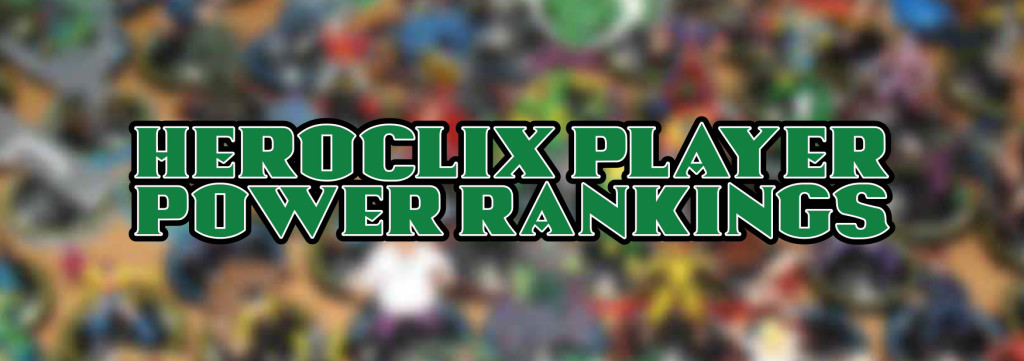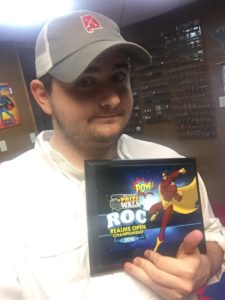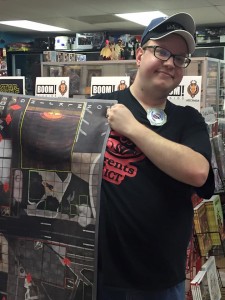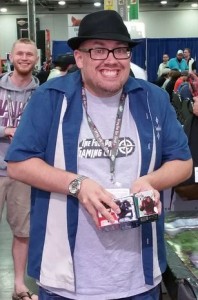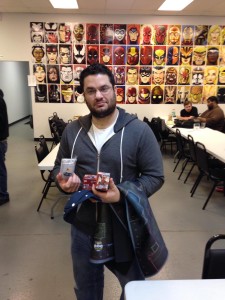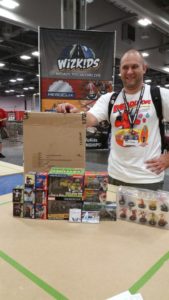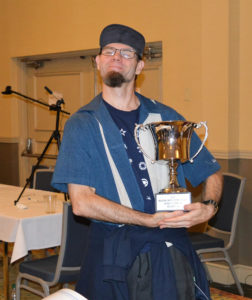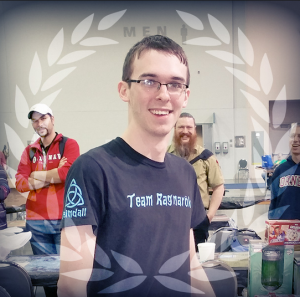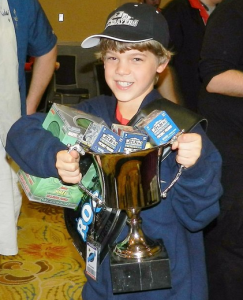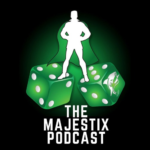by Will Gordon
Hello again, clix fans! It’s been way too long, but I’m back with a new list of the top 10 heroclix players in the world. We’ve seen the 2016 ROC Cup come and go (not without some controversy, I might add) as well as two rounds of Wizkids Open Regional events. With the ROC 2017 season heating up, it’s definitely time for a new list. The ten players have remained essentially the same, with only one new player moving in, but there has been some realignment among the players on the list. I want to take some time before revealing the latest top 10 to clarify the criteria for inclusion. I don’t use a formula to determine rankings and as I’ve said before, there is a fair amount of subjectivity to the process. The three-tiered evaluation process I use can be framed as skill, opportunity and results. Now, let’s take a closer look at how I define those three areas and make my determinations for compiling the list. What do you need to do to make the top 10? The short answer is win- preferably Worlds, the ROC Cup or Nationials, and then travel and win some more on the ROC or WKO circuit. For the long answer, please read on!
First, let’s address the concept of skill in heroclix. This is the most nebulous of the criteria I use and clearly subjective to a certain extent. However, if you’re ranking players of any game/sport, skill level has to be a key factor in your consideration. The problem with heroclix in this regard, is that it is very difficult to nail down exactly what makes a good clix player. Obviously, a clearly superior player can lose in this game to an inferior opponent due to build advantage or dice. While players that consistently blame dice for their losses are irksome, we’ve all had games where you can’t roll above a 5 and your opponent hits that 10+ repeatedly. From this standpoint, wins/losses can be deceiving and do not always tell the full story. I’ve seen instances where a good player has a tough first round match, hits the loser’s bracket and matches another top player who had a similar first round experience. One of those guys is now 0-2 and in a 4-Round Swiss with a cut to Top 8, may well be out on the day. Vice Versa, I’ve seen players who can barely play at a competent level breeze through with matchups/dice constantly in their favor and end up with a Top 4 finish in a competitive field. However, the truly elite players are able to play with a level of consistency that seldom finds them outside of the top 8. One of the primary skills I’ve identified is something I’ve adapted from the world of Economics- comparative cost analysis.
Comparative cost analysis is the concept of choosing the best option from a selection of mutually exclusive opportunities that all offer both positive and negative outcomes. This type of decision making is a constant in heroclix. Seldom do you get chances to make risk free plays and you usually have several options to consider in a fairly brief period of time. One of the key things I see in weaker players is the inability to factor in the consequences of missing an attack. Let’s say you have a chance to deal 4 damage and only need a 6 to hit. Or, with another figure, you need an 8 for only 3 damage. Easy choice, right? Not necessarily. What if the less likely to hit option leaves you out of range for a counter attack? Or the figure that does less damage has a higher defense and shape change? The sub-optimal offensive move can sometimes leave you in a better position on those occasions when you miss. Factoring in this secondary line of risk/reward can go along way in mitigating lousy dice when implemented effectively. However, there is a fine line between caution and being gun-shy and finding the right balance can be a tricky proposition.
There are a myriad of other decisions that one is faced with during the course of a game that are similar in nature. For example, the use of Close Combat Expert, Range Combat Expert and Perplexing Attack or Damage can be murky. In the vast majority of cases, it is better to maximize your attack value. If 4 damage ko’s a piece, but 3 leaves it on a Regen click, you are likely better off bumping the damage to a 4. However, this may not always be the case. If the opposing figure is pushed, for example, it won’t be able to heal next turn anyway. Subsequently, if you are going to be able to take another attack to finish it next turn, it may well be better to take that route rather than risking the longer odds to try to finish in one turn. Also, choosing a target can be a difficult choice in itself- with a tent-pole team, for example, do you start chopping away at the big guy, or eliminate the support? Knowing what you’re going to open up on the dials and exactly how those support pieces synergize with the main figure are crucial in making these decisions. These are elementary examples, but balancing the concept of maximizing percentages with being in an optimal position if you miss your attack, can be a complicated task. I believe that the game’s best players make effective use of this idea.
Another key component in heroclix skill is, of course, positioning. At the highest level of play, a one square positioning error can lead to a quick demise. When playing elite players, I find time and again that they’ll be either just out of range or the one piece I can get to is essentially sat there for bait. Proper positioning requires knowing your opponent’s figures as well as you know your own. What Improved Movement do they have? What stat boosts do they have access to that increase speed, etc? While some players are naturally better than others at positioning (I find that a chess background is helpful in this area), it is very much a learned skill that can be improved with experience and practice.
Unfortunately, it is difficult to determine how good a player positions by reading a brief tournament report or seeing the tournament standings. This is where my heroclix travels and numerous high level tournaments attended helps me in making these determinations. I have played so many of the top players and intently watched so many Top 8/Top 4/Final matches around the country that I am familiar with the majority of players that have won tournaments over the last few years. Those rare players that I have found that constantly amaze with pinpoint perfect positioning are generally Top 8 machines and a threat to win any time they show up for a tournament. Speed of play factors in here as well- expert positioning requires filtering through numerous options in a couple of minutes, placing your own figures and calculating the potential moves of your opponents- not an easy task, but one you need to master if you’re looking at making the top 10!
I have often said that heroclix is an easy game. However, the distinction should not be easy/hard, it’s actually simple/complex. High level heroclix becomes quite complex, because while nothing you do in this game is hard in and of itself, you do have to evaluate numerous factors simultaneously and make the optimal choice in a timely fashion. This requires a certain type of mental acuity that not everyone possesses- I believe that those who excel at this game have the capacity to process information in this way, both in an efficient and expedient manner.
The last thing I’ll address in terms of skill at this time is something tangentially related- build. Team-building happens to be my favorite part of heroclix. I do think team building is a skill in and of itself, but there is definitely a correlation with on-the-board skill and winning. Efficient team building utilizes comparative cost analysis, also. I love to see unique builds and players having success with figures that have not been seen in tournament play. However, I do not detract for “net-decked” builds or players using a team that has been well established. For the purpose of these rankings, build is basically factored in primarily in regards to how effective it is in the current meta. If the best option is a team that has been played numerous times already, so be it. I also give no regard to a figure being overpowered or “broken”- players don’t make the figures, I believe in playing the most effective pieces. I will use builds to a certain extent for virtual tie-breaking situations- if two players are very similar in terms of tournament success, positioning skill, etc., the edge goes to the player with the more creative, off-the-grid builds.
Ok, so that is a brief overview into what I think goes into making an elite heroclix player. However, having skills is only the first part of this equation. If you have all the talent/knowledge in the world, it is still necessary to prove it in competition. You have to give yourself opportunities. If you play 2 or 3 tournaments a year, it is going to be very difficult to find yourself on this list. In the best of worlds, you play a lot, you win a lot- but we can’t all be Easton Brock. The next best thing is to play a lot and Top 8 a lot. Or play sparingly and win consistently. In single elimination with top competition, it is exceedingly difficult to win outright with regularity. In fact, the top 4 players on this list are the only players who have done so in the time I have followed the heroclix tournament scene. Otherwise, top players generally win some, Top 8 consistently, hope to avoid missing cuts. There is some subjectivity with this as well. Let’s say a player who competes in 3 tournaments in a year- wins a Super Qualifier, gets Top 4 at Worlds, fails to qualify at a Wizkids Open Regional event. Now, that player is very difficult to rank, especially if he has no resume of success prior to these results. There simply isn’t enough data to factor in consistency, which is a key component to these rankings. If a player with an established resume (especially one with a recent World Championship, ROC cup or National Championship) stays active and consistently qualifies for tournament finals, regardless of size and competition level, that player has a strong chance of staying ranked even if the outright victories are few. Right now, there are 2 players who I feel are worthy of being considered top 10 players in the world- Adam Friedman and Aaron Cantu. Both of these guys are fantastic players, Adam recently won a WKO event, while Aaron just won a ROC Super Qualifier. However, going back over the past 2 years, neither has played enough events to warrant inclusion. Are they better than a couple of players on the list? Very likely so, but until they give themselves more opportunities, it is not viable for me to exclude more active players based on potential or supposition.
So that brings us to the easiest part of the rankings- Actual tournament success. At the end of the day, winning is the key. Obviously enough, first place finishes are the clearest determining factor for inclusion on this list. I consider the World Championship the biggest tournament Heroclix has- I mean, it’s right there in the name- World Champion. I give a great deal of weight to the World title- a win on the biggest stage is heroclix immortality. The handful of players with World Championships on their resumes will always be considered for this list as long as they remain active and achieve tournament success. Next, I consider the ROC World Cup the second biggest event. Some actually view the ROC as the bigger tournament, since it is the only one with the big cash prize. Definitely, a prestigious event and winners will receive strong consideration, even if they are not among the most active players. After that, ROC Regional events, Super Qualifiers, and Wizkids Open Regionals. There are numerous events on these levels, giving players from across the country a chance to post results and become known. Trust me, if you have won multiple events, you are on the radar.
The hardest thing about evaluating player results is the players that are almost exclusively in one arena or the other. There are a handful of players that have racked up 2 or 3 wins at SQ’s or WKO’s, but have never been to Worlds, Nationals, or the ROC Cup. I’m sure some of those players consider themselves worthy of inclusion, but comparing those players with ones who have had success at the big events is difficult. Vice versa, take a player like Luke Grace- back to back top 4 finishes at Worlds, but no wins and essentially no results from any other tournaments. Or Phil Isaacson, Jr.- 2nd place at Worlds two years in a row, 2nd at the ROC Cup in ‘15, Top 8 in ‘16, a couple of SQ/WKO wins. A great player who is definitely in the conversation, but just not quite enough results to hold a top 10 spot at this time. If he would have won any of the tournaments he took 2nd in, that would probably be enough. Also, with his resume established, if he does pop up and win another WKO, he gets a lot closer than someone who posts his first win. It can be a fine line, and there is room for disagreement, but that is basically how I evaluate tournament results.
OK, that was far from comprehensive, but I hope that brief insight into the factors that go into compiling this list has been helpful and/or interesting. Without further ado, here is my top 10 heroclix players in the world for March, 2017:
- Patrick Yapjoco
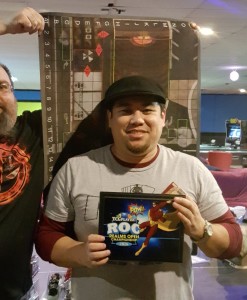
*2016 World Champion
*2014 World Champion (Singles and Team)
*2014 ROC Cup Champion
*10 ROC SQ wins
*Top 16 2015 Worlds
*WKO Regional winner (2016)
*2016 US Nationals Runner-Up
*2016 ROC Cup Top 4
Maintains a stranglehold on the number one spot, despite being essentially inactive since the ROC Cup, where he finished 3rd. He did also win a recent invitation-only online tournament featuring some of the game’s top players, beating Easton Brock in the final. I can’t imagine an evaluation process that doesn’t conclude that Patrick is the best heroclix player in the world. Occasional rumors of retirement from competitive play persist, but I fully expect him to be at Worlds in June to defend his title and seek to become the first ever 3 time champion.
*9 ROC SQ wins
*2015 Tennessee ROC state champion
*2016 Alabama and Georgia state champion
*2 WKO Regional wins (2016)
*WKO Regional winner (2017)
The most active of all the top players continues to rack up the wins. After finishing 2nd at the ROC Cup in controversial fashion, has added another SQ win, a WKO win, as well as a 2nd at another SQ. A truly fantastic player, and a clear #2, Easton has actually closed the distance on Patrick, but the gap is still substantial at this time.
*5 ROC SQ wins
*ROC Regional winner
*ROC Kansas State Champion
*2015 ROC Cup 5th place
*2016 Missouri State champion
*2016 ROC Cup Top 8
*WKO Regional winner (2017)
Josh has done enough to leap the great Kennie Pena. A second consecutive Top 8 at the ROC Cup was followed up with a recent WKO Regional win. I still think it’s a razor thin call between Josh and Kennie, but the higher level of activity just trumps the lack of Worlds/Nationals experience, in my mind. A great team builder as well, winning with some of the most innovative teams seen at high level competition.
- Kennie Pena
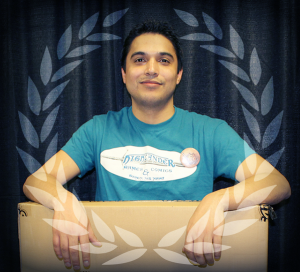
*2015 US National Champion
*2015 Canadian National Champion
*Top 8 2015 Worlds
*ROC Regional Champion
*4 ROC SQ wins
Top 16 at the ROC Cup, has been essentially inactive otherwise. Not that 2015 was ages ago, but has rarely competed since his banner year. A top tier player- if he’s at a tournament you’re at, expect to see him at the top table all day. Has done everything in this game except win one of the big 2, I wouldn’t rule out 2017 to be his time.
*2016 US National Champion
*2-time Wizard World Champion
*2-time DragonCon Champion
*2015 ROC Cup Top 4
A player who doesn’t play as much as I’d like, but a resume beyond reproach. The reigning US National Champion probably has more top finishes at big events over the last decade than anyone. Doesn’t play much on the ROC or WKO circuits, but always attends Worlds/Nationals and the ROC cup. The heroclix OG remains one of the favorites for any of the top events in ‘17.
*2010 World Champion
*2012 US National Champion
*WKO Regional winner (2016)
The exception to the rule in terms of inactivity, I just can’t leave George off the list. After being largely inactive for a couple of years has returned to play somewhat regularly over the past several months, winning a WKO Regional late last year. Despite a rough outing at the ROC Cup (damn you, Faust!), in terms of the skill I described to open this article, it’s hard to imagine a player much better than George. My understanding is he will be at Origins and a return to the pinnacle remains a real possibility.
*2015 Team World Champion
*2015 U.S. Nationals Runner-Up
*2016 Worlds Runner-Up
*WKO Regional winner (2016)
I still wish he played more, as well- no ROC participation, at all. However, the fact that he makes a run at Worlds every single year (Top 16 5 years running) cannot be ignored. A second place finish in ‘16 shows that his skills haven’t declined and the big win may well still be in his future. The World Champion tag (albeit team) helps out as well.
*2016 ROC Cup Champion
*2016 New York State champion
*WKO Regional winner (2016)
Another long time competitor at the highest level- Scott Crampton’s Four Points gaming teammate and father of last year’s ROC Cup champion finally broke through for the big win at this year’s cup. Despite the controversy in the Finals, Ed proved his mettle as an elite player with a fantastic tournament. He beat #1 Patrick in the Semi-Finals and was a deserving champion. Not the most active player, but always attends the big events and has played more recently on the ROC/WKO circuits, with a couple of wins and a couple of seconds.
*2015 World Champion
*ROC Arkansas State Champion
*1 ROC SQ win
*WKO Regional winner (2017)
Failed to qualify at the ‘16 ROC Cup, but fared quite well on the recent WKO circuit- 3 events, a Top 4, Runner-Up, and a win. The ‘15 World champion has turned into a Top 8 machine and I think there are more big wins to come. Also one of the game’s top team builders and one of the most active top players.
*20015 ROC Cup Champion
*2016 New Jersey State Champion
The boy wonder holds onto the last spot. Failed to follow up his ‘15 ROC Cup win with success at the ‘16 tournament and has been fairly inactive since. However, so good at such a young age and so much room for growth. The big win wasn’t that long ago and coupled with limitless potential, I’ll keep him in the 10 spot over other worthy contenders like Adam Friedman and Phil Isaacson, jr.
So, that’s the list. If you think your name should be here and it’s not- Hit the ROC and WKO circuits and post some wins. Like I said earlier, if you’ve won more than one, you are already on the radar. The ROC season is in full swing with SQ’s or Regional events pretty much every weekend in March and April. I hope to see and play some of you guys on the road to Origins- I’ll be back with a new list shortly before the big event. Until then, good luck and have fun playing with tiny plastic super people!
